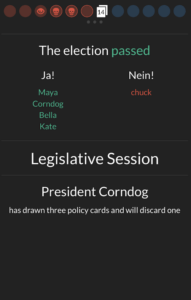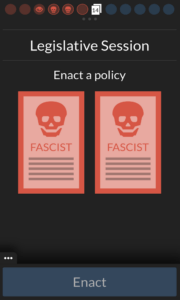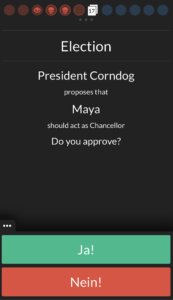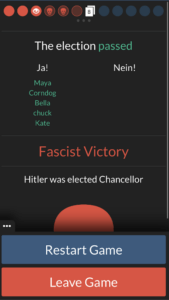I chose to play Secret Hitler (Voldemort version) created by Max Temkin, Mike Boxleiter and Tommy Maranges. I played it with 5 of my friends on netgames.io. The target audience is anyone with a notion of slightly more advanced social dynamics, like deception and coercion, and who is old enough to understand what political parties are. I would say it targets young teens and above.
There are few but important notable elements. There can be from 5-10 players, and this number can create very different dynamics as will be discussed later. Players go around the circle and can nominate chancellors to play certain party cards, either fascist or liberal. To win, or the objective, is for Liberals to reach a certain number of liberal cards and fascists to do the same with their cards. In this way, it is a group collection game. Another way Liberals can win is by killing the secret Hitler, but this can only be done if a fascist card is in play, which adds an interesting curve ball to who wants to pretend to be who when it gets to be late in the game. On the same vein, if Hitler gets elected at this point, the fascist win. Three cards are given to whoever’s turn it is, and if their chancellor is elected, they hand off two cards for that person to choose what to enact.
This is where social dynamics come into play. Anyone can lie about what hand they were given. For example, a fascist chancellor could lie and say that they were given only two red cards to choose from so they have to enact one, and try to place the fascist blame on the person whose turn it is. And of course a fascist can choose liberal cards to look innocent. Towards the end of the game, though, if the liberals are losing, it could be good for one of them to try and act suspicious to get a fascist to vote them chancellor so they get the potential power to kill off fascists.
This is a similar game to Mafia but more so The Resistance, which I have played before and also uses physical objects to act as mechanics and must be used with specific constraints. There are more opportunities to construe trust in this game than there are in Mafia, like the Resistance, but the extra outrageous theme of Hitler adds an extra subliminal ethical factor that I personally think amplifies game play. This creates more opportunities for personal role playing than a game like the Resistance, which helps people become more creative with their deceptions. For example, in my play, there was a very sweet and girl who literally felt that it was morally wrong to be on the fascist team, and the other players could also really feel that because she was not very good at hiding this. Later in the game this helped her when she was assigned as a fascist. The voting for chancellor is also very important because it gives one person a lot of power. With a more dynamic play perhaps with a bigger group than I played with, I could see this being a good tool for finding allies. The personal aspect of having to nominate someone other than yourself (which you can’t do in the Resistance) creates more comradery and betrayal as the game goes on, which again adds to its captivating potential.
One thing that was slightly difficult to overcome, though, was merging all of these complicated mechanics while also keeping track of players as well as your own character. I only played with 5 people, and it took us a not so fun throw away round to really be able to comfortably play the game. Many people had difficulties overcoming the complicated rules and cards and it was hard to keep things secret. However, once we got the hang of it, we couldn’t stop playing because of all the different permutations of possible outcomes of elections, card draws, and everyone’s reactions to things.
I think this game is so fun. I like it more than mafia because there are game pieces that control the narrative, and only a couple people have the possibility of dying (and exiting the game) only near the end, so everyone gets to play for most of the time. As I mentioned before, I like it more than the Resistance because it just gets more personal and you can be sillier with it. Sometimes people take on German or French or whatever accents, people get personally connected to their “party” etc etc. Our best success was when Hitler won by getting elected chancellor (yes I was Hitler this round).
There is a much lower chance of that happening than all of one party winning or Hitler dying, which was very satisfying. That is one thing I would actually also add to the differentiations of other games, is that there are multiple different ways to win and lose.
I think the annoying thing about this game is that if you are not committed to learning the rules beforehand and maybe playing a throw away round, it is hard to be fully engaged and have fun with deception. I actually tried to play this game many years ago but my friends at the time and I never ended up finishing our first round because we were too confused to get through it. But, for this assignment, I assured my friends that we could keep the first round short and just be honest about who you are to get an understanding of what to do. It is hard to propose a solution for this, as the complex rules end up making more complex dynamics. Maybe a disclaimer that people should play a throw away round quickly to improve game play could be helpful. At least then if people don’t play that round and they don’t like it people could be like “oh well they did warn us maybe let’s try again” rather than “this is way too hard.” And the people that succeeded on the first try can be like “woohoo we rock and are so smart for figuring this out!”







